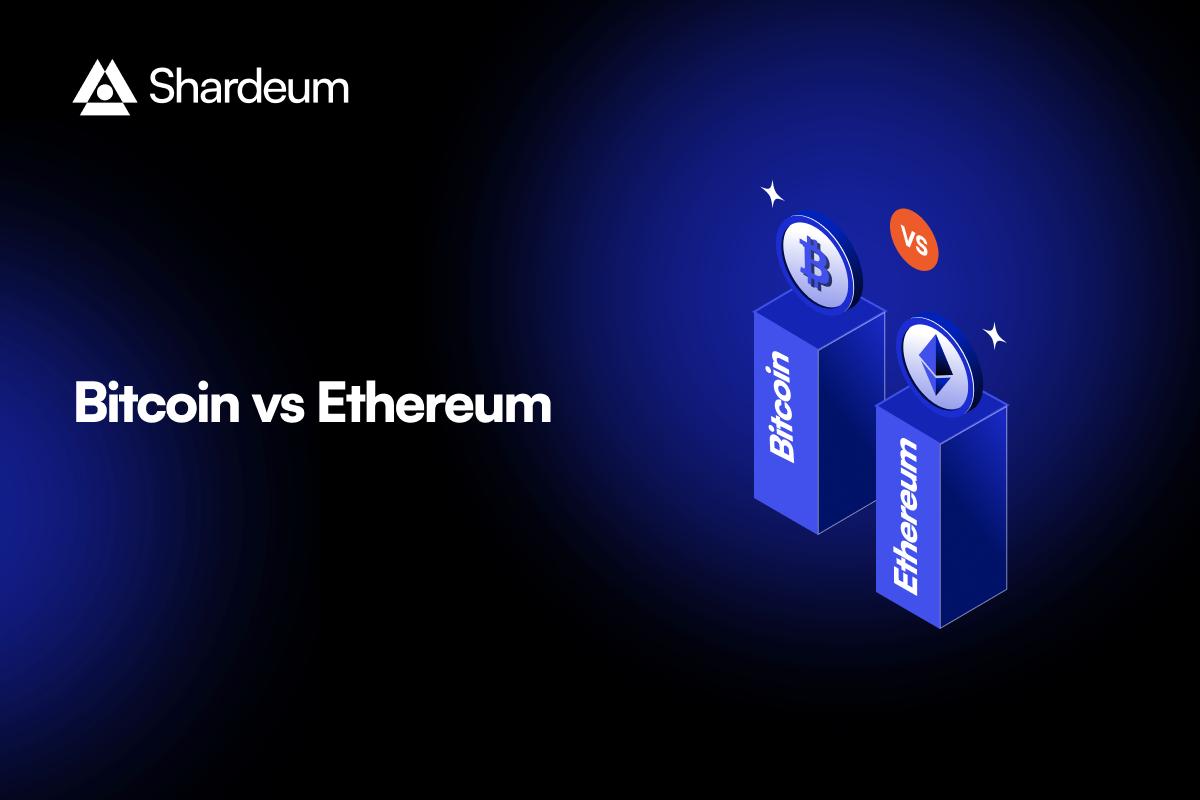
Ethereum vs. Bitcoin: What’s the Difference?
Explore the fundamental differences between Bitcoin and Ethereum, including their consensus mechanisms, applications, and market roles. Read on to know...

Explore the fundamental differences between Bitcoin and Ethereum, including their consensus mechanisms, applications, and market roles. Read on to know...
How is BTC different from ETH? Bitcoin and Ethereum are among the top three cryptocurrencies in the market at the moment by market cap, but Bitcoin-Ethereum differences are many. While Bitcoin is well-established as a crypto trusted by many investors, Ethereum has the upper hand over Bitcoin when you consider its smart contract functionalities and the many DApps it helps build. How is BTC different from ETH, and how does Bitcoin vs. Ethereum work out? Let’s find out!

How is BTC different from ETH? Before considering the Ethereum-Bitcoin differences, let’s learn a little about both cryptos. Bitcoin is a peer-to-peer payment network that facilitates seamless cross-border transactions. It was first introduced in 2009 by a pseudonymous person or group named Satoshi Nakamoto. Running on a decentralized blockchain, Bitcoin allows direct transactions between users without third-party involvement. The most important aspect of Bitcoin is that it maintains the anonymity of those sending and receiving money.
We know that a fee or service charge is applied whenever we use a bank to complete a transaction. Bitcoin charges a cheaper transaction fee compared to conventional cross-country electronic transfers, which adds to its appeal.

Ethereum was developed in 2015 by Vitalik Buterin. This crypto is based on the same underlying principles as Bitcoin. Unlike Bitcoin, though, decentralized applications can be created and launched using Ethereum. In fact, most DApp developers prefer to use Ethereum for the creation of decentralized applications. Peer-to-peer payments are possible using Ethereum, like Bitcoin. Ethereum also facilitates smart contracts for a range of purposes; smart contracts are automated digital contracts that self-execute when all predefined conditions are met.
How is BTC different from ETH? There is an increasing interest in the debate of Bitcoin vs. Ethereum. On one hand, Bitcoin has had over ten years of journey in global finance. It has the greatest market cap among all currently accessible crypto assets, and it is, in a sense, the current crypto world champion.
Meanwhile, Ethereum’s founder learned from Bitcoin and created more functionalities based on Bitcoin’s ideals. Although the same distributed ledger and cryptography principles underlie both the Bitcoin and Ethereum networks, the two have major technical differences. For instance, data attached to transactions on the Ethereum network might be executable code, whereas data attached to transactions on the Bitcoin network is solely used to record transaction details. Additionally, there are discrepancies in their consensus algorithms and block times (an ETH transaction is confirmed in seconds instead of minutes for BTC).
To consider the Ethereum-Bitcoin differences, you need to compare the consensus mechanisms used by both. Proof of work (PoW), a consensus protocol used by Bitcoin, makes use of the action called ‘mining’ to ensure data integrity. Miner nodes on the chain have to solve complex mathematical problems to win the right to add blocks on the Bitcoin chain.
Meanwhile, as a major point in the Bitcoin vs. Ethereum debate, Ethereum recently shifted to a proof of stake algorithm from a proof of work one through a major event called the Merge. On a PoS blockchain, one has to lock up a certain amount of the native crypto to take part in block validation.

In Ethereum-Bitcoin differences, the primary distinction between Bitcoin and Ethereum is that Bitcoin was created as a reasonably straightforward method of making virtual payments. While Ethereum can also accommodate advanced financial software, Ethereum was created to primarily facilitate decentralized applications.
As a replacement for conventional currencies, Bitcoin primarily serves as a medium of exchange and a store of wealth. Ethereum is a programmable blockchain with use cases in DeFi, smart contracts, and NFTs.
As a result, they utilize comparable blockchain technology, and many of the same investors find them attractive. Both cryptocurrencies are publicly available on crypto exchanges, and many individuals continue to purchase them not for their current value but for their alleged investment potential.
The supporters of Bitcoin frequently refer to it as “digital gold.” The phrase alludes to the notion that bitcoin can act as a store of value that is independent of other financial markets, such as equities, and is comparable to that of gold.
Those who harbor bullish sentiments regarding cryptocurrency also view it as a “safe haven” asset that can protect investors from rising prices and economic volatility that weaken fiat currencies like the U.S. dollar and the Indian Rupee.
Bitcoin’s limited supply (the maximum number of bitcoins that can be created is 21 million) helps it maintain its value. Meanwhile, due to its global ranking as the second-largest cryptocurrency by market cap and its wide range of uses, Ethereum is compared to digital silver.
As of August 30, 2022, Bitcoin’s market size was $376.5 billion, or around 39.6% of the overall market capitalization of cryptocurrencies, which stood at a little over $954.3 billion. With an $818.8 billion market valuation, Ethereum had a market share of 18.8% at that point.
There are currently more than 18 million BTC in circulation, whereas there are over 120 million Ether coins in circulation.

Peer-to-peer transactions are made possible via Bitcoin. It performs the same function as fiat currencies but is free from centralized control. There are no exorbitant transaction fees to pay, and you are completely in charge of your funds.
Bitcoin miners can compete to add blocks to the chain with the proof of work mechanism. The mining process requires special hardware made for the purpose, and the miners have to solve a complex mathematical puzzle to be the first one to add a block. Winning miners get rewarded with new bitcoins and a part of the platform fees.
Peer-to-peer transactions are likewise possible with Ethereum, but it also offers a framework for developing distributed DApps and smart contracts. Plus, users can exchange about anything of value using a smart contract, including shares, cash, real estate, etc.
As for the new PoS Ethereum, proof of stake blockchains utilizes the technique called staking to encourage users to pledge cryptocurrency to attest to the validity of transactions. When a validator node successfully does its work, they are rewarded with native tokens, a part of the platform fees, and more.
So, at the end of the Bitcoin vs. Ethereum debate, there is truly no winner. While Bitcoin is definitely the more trusted crypto due to its long years of journey, Ethereum brings a varied range of applications that many would find preferable. As a trader or a crypto enthusiast, ultimately you’d have to consider the Bitcoin-Ethereum differences for yourself, and decide which one is preferable to you.
One of the biggest similarities between Bitcoin and Ethereum is that both these platforms support decentralization. They have separate blockchains that are open to all users globally to execute various operations like trading. Bitcoin and Ethereum are also both leading cryptocurrencies across the globe that a majority of investors have faith in.
The main Ethereum Bitcoin difference is that Bitcoin makes use of a proof of work consensus mechanism, while Ethereum has already shifted to an energy conserving proof of stake consensus mechanism. Plus, while Bitcoin’s main functionality is as a currency, Ethereum leans towards supporting decentralized applications.
What is the Graph | Testnet Vs Mainnet | Tangle Vs Blockchain | Software Wallet for Crypto | Mastercoin Crypto | Hyperledger Vs Ethereum Blockchain | API Vs Blockchain | CBDC Blockchain | Stablecoin Vs CBDC | What is Staking in Crypto | Blockchain Proof of Authority | What is Waves Cryptocurrency | Hyperledger Fabric Blockchain | Blockchain Hard Fork vs Soft Fork | Risks of Crypto Lending | Centralized vs Decentralized Cryptocurrency | TVL in Crypto | EVM Vs Non-EVM Chains | Slope Wallet Vulnerability | Blockchain Forks